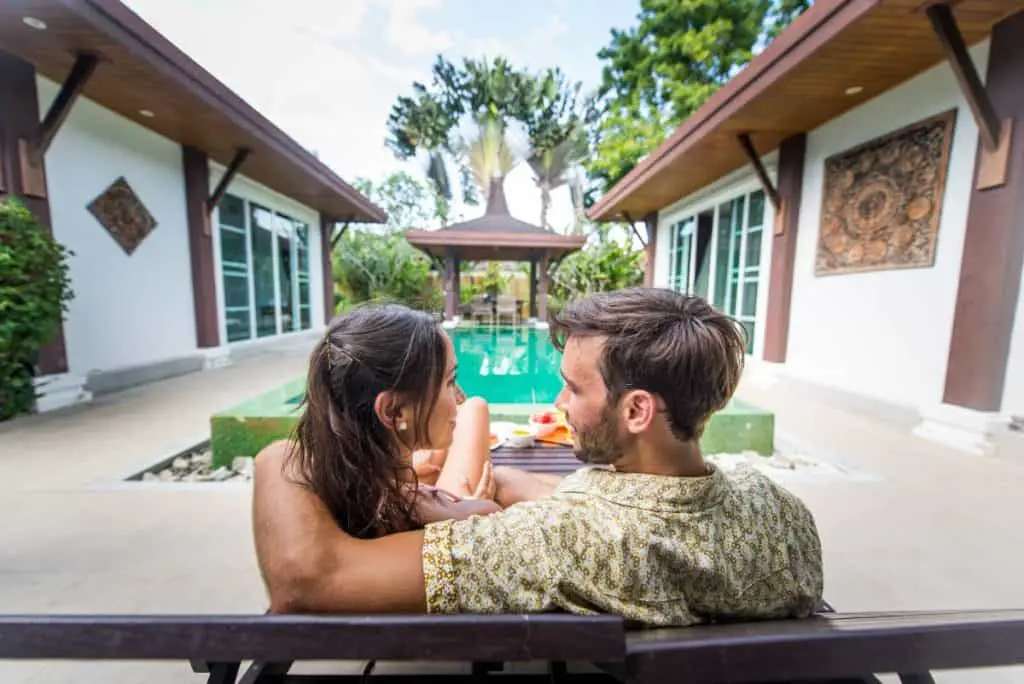Buying Property in Thailand Cultural Considerations
Welcome to the Land of Smiles, where ancient traditions blend seamlessly with modern aspirations. As an expat who’s swapped the American dream for Thai adventures, I’m here to guide you through the fascinating world of Thai real estate. At BetterLivingAsia.com, we’ve seen countless foreigners dive into this market, chasing dreams of owning a slice of paradise. But here’s the thing: it’s not just about finding the perfect beachfront condo or mountain villa. It’s about navigating a maze of cultural nuances that can make or break your property dreams. So, grab a cold Chang, and let’s embark on this exciting journey together!
Key Takeaways
- Understanding Thai culture is crucial for successful property transactions in Thailand
- Legal considerations and regional differences play a significant role in property acquisition
- Adapting to local customs and building relationships can greatly enhance your property-buying experience
Legal Considerations for Foreign Property Buyers
The Thai Land Code Act
The landscape of foreign property ownership in Thailand has recently undergone a significant transformation. While the Thai Land Code Act has traditionally been restrictive for foreigners wanting to own land, a groundbreaking development has emerged:
As of 2022, specific categories of foreigners can now own land in Thailand:
- Wealthy individuals
- Retirees
- Foreign nationals who want to buy real estate in Thailand may find the process quite different from their home countries.
- Highly skilled expatriates
Here’s the crucial detail: An investment of at least THB 40 Million (approximately USD 1.1 million) is required. Successful applicants will be able to own up to 1 Rai (1,600 square meters) of land in Thailand.
This is a monumental shift in Thai property law, opening up new possibilities for foreign investors and long-term residents. It’s like Thailand has rolled out a red carpet for high-net-worth individuals looking to put down roots in the Land of Smiles.
However, it’s important to note that this is a substantial investment, and not all foreigners will qualify. For those who don’t meet these criteria, the traditional restrictions still apply, and the options we’ll discuss next (like condo ownership or leasehold agreements) remain relevant.
The Condominium Act
Enter the hero of our story: the Condominium Act. This nifty law allows foreigners to own condos, with a catch. There’s a foreign ownership quota that caps foreign ownership at 49% of the total unit space in any condo building. It’s like musical chairs, but with apartments!
Ownership Options for Foreigners
Let’s break down your options:
- Direct Land Ownership: For those who can invest THB 40 Million or more, owning up to 1 Rai of land is now possible.
- Freehold Condo Ownership: This remains a popular choice for many foreigners, with the 49% foreign ownership quota still in effect.
- Leasehold Property: For those who don’t meet the land ownership criteria or prefer not to invest such a large sum, leasing property for up to 30 years (with the possibility of renewal) is still a viable option.
Other Property Types
For other types of properties like houses or villas, Thai law prohibits direct foreign ownership. However, there are some creative workarounds:
- Setting up a Thai company: You can establish a Thai Limited Company with the majority of shares (more than 51%) held by Thai individuals or entities. The company can then purchase the property, and you can control it through your shareholding.
- Leasehold agreements: You can buy the right to use a property “for a period of time” through a leasehold, typically for about 30 years.
Navigating these legal waters can be tricky. It’s like trying to eat som tam with chopsticks – possible, but why make life difficult? That’s why at BetterLivingAsia.com, we always recommend working with a reputable lawyer who specializes in Thai property law. Trust me, it’s worth every baht!
Cultural Aspects Influencing Property Transactions
Alright, now that we’ve got the legal stuff out of the way, let’s dive into the fun part – the cultural quirks that make buying property in Thailand a unique experience.
First up, let’s talk about “face”. No, I’m not talking about your beautiful mug. In Thai culture, saving face is everything. It’s like a game of poker, where everyone’s trying to maintain their dignity and avoid embarrassment. When you’re negotiating a property deal, remember that pushing too hard or causing someone to lose face can backfire faster than eating a whole plate of som tam pla ra (trust me, I’ve been there).
Next, let’s practice your wai. The wai greeting is more than just a hello – it’s a sign of respect. When you’re meeting with property agents or sellers, a well-executed wai can open doors (literally and figuratively). Here’s a quick wai 101:
- Press your palms together in front of your chest
- The higher your hands, the more respect you’re showing
- Slight bow of the head for extra points
Now, let’s talk about Buddha. Buddhism isn’t just a religion here; it’s a way of life that influences business practices. Don’t be surprised if your property agent suggests a “luckiest” day to sign contracts or if there’s a small spirit house on the property you’re viewing.
Hierarchy is another big deal in Thai society. Age and social status matter, so when you’re dealing with senior members of a company or older property owners, show extra respect. It’s like playing a game of chess – knowing which pieces hold the most power.
Lastly, remember that in Thailand, personal connections and Understanding the value of the property are everything when you want to buy. Building relationships isn’t just nice – it’s necessary. So don’t be surprised if your property agent wants to take you out for a meal to discuss your plans to buy real estate in Thailand or chat about your family. It’s all part of the process of building trust, or as we say in Thai, “kwaam wai waang jai”.
By understanding and respecting these cultural nuances, you’re not just buying a property – you’re becoming part of the community. And trust me, that’s worth more than any beachfront view (although those are pretty nice too).

Understanding Regional Differences in Thai Property Markets
Buckle up, folks! We’re about to take a whirlwind tour of Thailand’s property hotspots. Just like how pad Thai tastes different in every street stall, each region in Thailand has its own flavor when it comes to real estate.
Let’s start our journey in the Big Mango – Bangkok. The capital is a concrete jungle where modern condos touch the sky and traditional wooden houses hide in quiet sois. Here, it’s all about location, location, location. A condo near a BTS station? That’s like striking gold in a tom yum soup!
| Region | Property Type | Key features of the property can significantly impact its value in the real estate market. |
|---|---|---|
| Bangkok | High-rise condos, townhouses | Close to public transport, business districts |
| Chiang Mai | Traditional houses and boutique condos are popular choices for those looking to buy a property in Thailand. | Mountain views, cooler climate, cultural attractions |
| Phuket | Villas, beachfront condos | Sea views, tourist hotspots, rental potential |
| Pattaya | Beachside condos, resort-style developments | Affordable prices, expat-friendly community |
Now, let’s head up north to the rose of the north – Chiang Mai. Here, you’ll find a mix of traditional Lanna-style houses and modern developments. The property market in Chiang Mai is like a good massaman curry – rich in culture with a touch of modernity.
Feeling beachy? Let’s get down to Phuket. The Pearl of the Andaman is all about luxury villas and beachfront condos. Buying property here is like ordering a coconut on the beach – it comes with a view, but it might cost you a pretty penny.
Last but not least, we have the Eastern Seaboard, with Pattaya leading the pack. Known for its affordable beachside condos and large expat community, buying property in Pattaya is like finding a familiar face in a sea of strangers.
Property Search and Due Diligence Process
But before you go running off to every “For Sale” sign you see, let’s talk strategy.
First things first, find yourself a good real estate agent. A reputable agent in Thailand is like a good tuk-tuk driver – they know all the shortcuts and can get you where you need to go without getting lost (or overcharged).
Now, let’s talk about how Neighborhood research is essential when considering where to buy a property in Thailand. This is crucial, folks. You wouldn’t buy a som tam without knowing what’s in it, would you? The same goes for property. Here’s a quick checklist:
- Check out the local amenities (markets, hospitals, schools)
- Visit at different times of day (that quiet soi might turn into party central at night)
- Talk to potential neighbors (they’re your best source of insider info)
When it’s time for property viewings, remember your cultural etiquette. Take off your shoes before entering a home, and don’t point your feet at anyone (it’s considered rude). And for Buddha’s sake, don’t sit on any pillows – they’re for your head, not your behind!
Lastly, let’s talk about due diligence. This is where you put on your detective hat and dig deep. Here’s what you need to do:
- Title searches are a vital part of the process when buying real estate in Thailand.: Make sure the property is legally owned and can be sold
- Legal checks: Verify all documents are in order
- Building inspections: Look for any structural issues or needed repairs
Financing Options for Foreigners
Now, let’s talk about everyone’s favorite topic – money! Financing a property in Thailand as a foreigner can be trickier than pronouncing “Krung Thep Mahanakhon Amon Rattanakosin Mahinthara Ayuthaya Mahadilok Phop Noppharat Ratchathani Burirom Udomratchaniwet Mahasathan Amon Piman Awatan Sathit Sakkathattiya Witsanukam Prasit” (yes, that’s Bangkok’s full ceremonial name).
Your main options are:
- Cash purchases: Straightforward, but requires a hefty upfront investment.
- Mortgages for foreigners: Available, but with some strings attached.
If you’re going the mortgage route, be prepared for some hoops to jump through. Thai banks typically require:
- Proof of income (usually from a Thai company)
- Work permit or long-term visa
- Substantial down payment (often 30-50%)
Interest rates for foreigners are usually higher than for Thai nationals, and loan terms are typically shorter. It’s like ordering spicy food in Thailand – they might tone it down for foreigners, but you’re still going to feel the heat!
Here’s a quick comparison:
| Financing Option | Pros | Cons |
|---|---|---|
| Cash Purchase | No interest, quick process | Large upfront cost |
| Thai Bank Mortgage | Spread out payments | Higher interest, strict requirements |
| Foreign Bank Mortgage | Potentially better terms | Limited options, currency risk |
Each situation is unique. At BetterLivingAsia.com, we recommend consulting with a financial advisor who understands both Thai property laws and your home country’s tax implications. It’s like having a good map when navigating the chaotic streets of Bangkok – invaluable!
Negotiation and Purchase Process
Cultural Sensitivity in Negotiations
Alright, you’ve found your dream property, and you’ve got your financing sorted, now it’s time for the fun part – negotiation! In Thailand, negotiating is an art form, like creating a perfect plate of pad thai. It’s all about balance, timing, and a dash of charm.
First, let’s talk about cultural sensitivity in price negotiations. Remember that concept of “face” we discussed earlier? It’s crucial here. Pushing too hard or being too aggressive can cause the seller to lose face, which might derail the whole deal. Instead, think of it as a gentle dance in the real estate market – two steps forward, one step back.
Here are some negotiation tips:
- Start with a reasonable offer (lowballing might be seen as disrespectful)
- Be patient (rushing can be seen as desperation)
- Use a neutral tone (getting emotional is a no-no)
- Be prepared to compromise (it’s expected)
Speaking of compromise, it’s a cornerstone of Thai business culture. Don’t expect to get everything you want – aim for a win-win situation where both parties feel satisfied. It’s like ordering food in Thailand – sometimes you might not get exactly what you expected, but you’ll probably end up happy anyway!
Once you’ve agreed on a price, it’s time for the written agreement. This is where buying real estate in Thailand gets serious. Make sure everything you’ve agreed upon is clearly stated in the contract. And I mean everything related to the property purchase – from the purchase price to who’s responsible for fixing that leaky faucet.
Finally, we come to the closing procedures and transfer of ownership. This usually happens at the Land Office, where you’ll sign documents, pay any remaining fees and taxes, and officially become a property owner in Thailand. It’s a bit like a Thai wedding ceremony – lots of paperwork, a bit of ceremony, and at the end, you’re officially committed!
The Buying Process
Once you’ve agreed on a price, here’s what the buying process typically looks like:
- Reservation Agreement and Deposit: You’ll sign a reservation agreement and pay a deposit, usually around 10% of the purchase price.
- Escrow Account: It’s common to use an escrow account to hold funds during the transaction. In Thailand, only certain financial institutions are authorized to provide escrow services.
- Full Payment and Transfer: The remaining balance is usually paid within 30-90 days after signing the reservation agreement.
- Land Department Registration: Both parties meet at the Land Department to complete the property transfer. The buyer brings the full payment, while the seller provides necessary documents.
- Taxes and Fees: As a buyer, you’re responsible for various taxes and fees, including transfer fees, specific business tax, stamp duty, and withholding tax.
Throughout this process, patience is key. Things might move slower than you’re used to, but that’s just the Thai way. Pour yourself a cold Singha, sit back, and enjoy the ride. Before you know it, you’ll be holding the keys to your very own piece of Thai paradise!
Navigating Business Structures for Property Ownership
Now, let’s dive into the world of Thai Limited Companies for property ownership. It’s like ordering a mystery box at a Thai night market – exciting, but you need to know what you’re getting into!
Some foreigners choose to set up a Thai company to own property, especially if they’re looking at land or a house. Here’s the lowdown:
Pros:
- Can own land through the company
- Potential tax benefits
- More control over the property
Cons:
- Complex setup and maintenance
- Strict regulations on foreign ownership percentage
- Annual audits and reporting requirements are often necessary when investing in real estate in Thailand.
It’s important to note that using a company solely to circumvent foreign ownership laws is a big no-no. It’s like trying to sneak durian onto a plane – you might get away with it, but the consequences aren’t worth it!
If you do go this route, be prepared for some cultural considerations in business partnerships. You’ll likely need Thai shareholders, and building good relationships with them is crucial. It’s all about trust, respect, and yes, face-saving again!
Post-Purchase Considerations
Congratulations! You’ve navigated the cultural maze, signed on the dotted line, and now you’re the proud owner of a Thai property. But wait, the adventure isn’t over yet! Let’s talk about what comes next.
First up, is property management. If you’re not planning to live in your property full-time, you’ll need to decide how to manage it. Options include:
- Self-management (if you’re up for the challenge)
- Hiring a local property management company
- Relying on a trusted friend or long-term tenant
Remember, managing property in Thailand comes with its own set of cultural quirks. For example, Thai tenants might expect more hands-on attention from landlords than you’re used to. It’s like being a good host – you need to be attentive without being intrusive.
Next, let’s talk about renovations. Before you start knocking down walls or adding that infinity pool, make sure you’re aware of local regulations. Some areas have strict rules about what you can and can’t do, especially if you’re in a historical area or a condo with a juristic person (like a HOA).
Lastly, don’t forget about taxes. As a foreign property owner, you’ll need to navigate both Thai tax laws and potentially those of your home country. It’s like trying to eat soup with chopsticks – tricky, but not impossible with the right guidance.
Here’s a quick rundown of some taxes you might encounter:
- Annual property tax
- Rental income tax (if you’re leasing out your property)
- Capital gains tax (if you sell the property)
Tax laws can change, so it’s always best to consult with a tax professional who understands both Thai and international tax implications.

Adapting to Local Community and Lifestyle
Owning property in Thailand isn’t just about having a place to live or invest – it’s about becoming part of a community. And let me tell you, it’s one of the most rewarding aspects of this whole adventure!
First, let’s talk about understanding neighborhood dynamics. Thai communities, especially in more traditional areas, often have their own unique rhythms and unwritten rules. It’s like learning a new dance – at first, you might feel a bit out of step, but soon you’ll be moving in harmony with everyone else.
Here are some tips for integrating into your new community:
- Participate in local events and traditions: Whether it’s Songkran (Thai New Year) or a local temple fair, getting involved is a great way to meet neighbors and show respect for local culture, which can also enhance the value of the property.
- Learn some Thai: Even basic phrases can go a long way in building relationships. Your neighbors will appreciate the effort, even if your tones are all over the place!
- Be mindful of local customs: This could mean anything from dressing modestly to being quiet during certain hours. When in doubt, observe and follow your neighbors’ lead.
- Contribute to the community: This could be as simple as helping to clean up the street or supporting local businesses.
Residency Options Through Property Ownership
Long-Term Resident (LTR) Visa
Since 2022, it’s become possible to become a resident of Thailand by buying property. The Thai government introduced the Long-Term Resident (LTR) Visa, which includes a category for “Wealthy Global Citizens.” To qualify, you need to invest at least $500,000 in Thai government bonds, foreign direct investment, or Thai property.
However, property ownership alone doesn’t guarantee qualification. You’ll need to meet additional criteria, such as owning a significant amount of assets.
Thailand Elite Visa
If you want to reside in Thailand without necessarily buying property, consider the Thailand Elite Visa. This long-term visa program allows stays of 5, 10, or 20 years, depending on the chosen package. While technically a tourist visa, it offers many benefits typically associated with residency packages.
FAQs
What should I know about property in Thailand before I decide to buy property?
It’s essential to understand the local real estate market, including property values and the legal framework regarding ownership in Thailand. Familiarize yourself with Thai property law, especially regarding foreign ownership, as it can impact your ability to purchase property.
Can foreigners buy property in Thailand?
Yes, foreigners can buy property in Thailand, but there are specific regulations. Foreigners can own a condominium outright, but land ownership is more complex and often requires purchasing through a Thai company or leasehold agreements.
What are the risks associated with buying real estate in Thailand?
Risks include fluctuating property prices, legal issues regarding ownership, and potential difficulties in managing the property remotely if you are not living in Thailand. It’s advisable to seek legal counsel and conduct thorough due diligence before making any investment in Thailand.
How can I ensure that the property I want to buy is a good investment?
Research the local real estate market thoroughly, including property values and trends. Consult a local real estate agent and consider factors such as location, accessibility, and the potential for property appreciation or rental income when investing in real estate in Thailand.
What is the buying process in Thailand for foreigners?
The buying process typically involves finding the right property, negotiating the purchase agreement, conducting due diligence, and transferring ownership. It’s advisable to engage a reputable real estate agent and a legal advisor to guide you through the process.
Conclusion
Buying property in Thailand as a foreigner is an exciting journey, but we understand it can also be complex. From legal considerations to cultural nuances, there’s a lot to navigate.
At BetterLivingAsia.com, we’re here to make your Thai property dreams a reality. Whether you’re looking at a Bangkok condo, a Phuket villa, or a Chiang Mai house, we’ve got the expertise to guide you.
Have questions? We’re here to help! No query is too big or small. Simply reach out to us at BetterLivingAsia.com, and we’ll do our best to assist you in any way we can.
Your Thai property adventure awaits – let’s embark on this journey together!






